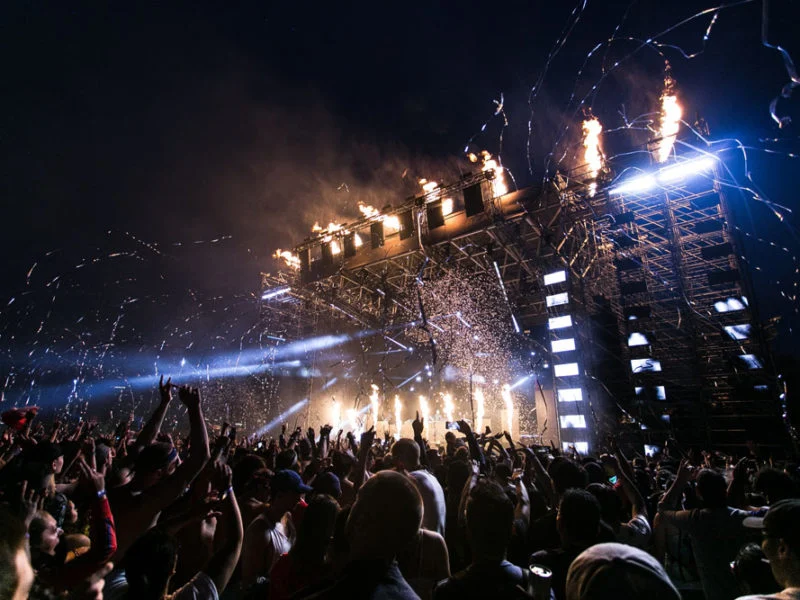The Future of Music Festivals: Holograms, AI, and Live Bands Combined


El Valle Grita – Music festivals have always been about bringing people together to enjoy live performances. However, the future promises to transform these gatherings in unprecedented ways. Technology is reshaping how artists perform and how audiences experience music. Innovations like holograms, artificial intelligence (AI), and hybrid live bands are revolutionizing festivals. Consequently, these elements create immersive, dynamic, and personalized experiences. This article explores how these cutting-edge trends will redefine music festivals around the world.
“Read More: US Department of Commerce Blocks DeepSeek, Strict Privacy Policy in Europe”
How Holograms Enhance Live Performances Dramatically
Firstly, hologram technology enables artists to appear on stage without physically being there. For example, legendary musicians who have passed away can “perform” alongside contemporary artists. Additionally, holograms allow performers to multiply themselves or create surreal visual effects during shows. These visuals captivate audiences in ways traditional concerts cannot. Moreover, holograms can project on multiple stages simultaneously, reaching wider crowds. This innovation not only preserves musical legacies but also pushes creative boundaries. As a result, festival-goers enjoy uniquely spectacular performances.
AI Composing and Performing Music in Real Time
In addition to holograms, AI increasingly contributes to music creation. AI algorithms compose melodies, harmonies, and rhythms that blend with live instruments. Furthermore, AI can improvise alongside musicians, responding to crowd energy and tempo changes. This dynamic interaction enhances spontaneity and originality in shows. Besides composition, AI-driven visual effects synchronize with music in real time. Consequently, performances become multisensory experiences that engage sight and sound harmoniously. Therefore, AI integration broadens artistic possibilities and deepens audience connection.
“Read About: Exciting Events Festivals You Shouldn’t Miss This Year”
Hybrid Live Bands Merging Human and Digital Talent
Moreover, future festivals will feature hybrid bands that combine live musicians with digital avatars or AI performers. These collaborations offer new musical textures and experimental sounds. Musicians can interact with AI band members, creating unpredictable and fresh performances. This blend allows artists to push genre boundaries and innovate stagecraft. Simultaneously, it challenges traditional ideas about what constitutes a “live” performance. Hence, hybrid bands symbolize the fusion of technology and human creativity, enriching festival lineups globally.
Personalized Festival Experiences Through Data and AI
Besides transforming performances, technology personalizes festival experiences for attendees. Through apps and wearable devices, organizers gather data about preferences and moods. Using AI, festivals tailor recommendations for stages, food, and activities accordingly. Moreover, virtual reality (VR) and augmented reality (AR) provide customized interactions, such as virtual meet-and-greets or exclusive backstage access. This personalization fosters deeper engagement and satisfaction among fans. Therefore, technology enables festivals to become more attendee-centric and immersive than ever before.
Sustainable Technologies Making Festivals Greener
Furthermore, sustainability is a growing concern for festival organizers. Innovative technologies contribute to reducing environmental impact significantly. For instance, AI optimizes energy use by adjusting lighting and sound systems in real time. Solar-powered hologram projectors and eco-friendly materials minimize carbon footprints. Additionally, digital tickets and cashless payments reduce paper waste and improve security. These advancements align festivals with global sustainability goals. Consequently, future music events become models of ecological responsibility and innovation.
Virtual Festivals Expanding Access Globally
In addition, virtual music festivals offer access to audiences unable to attend in person. Thanks to VR and 5G connectivity, fans can join immersive online events from anywhere. These virtual festivals replicate real-world atmospheres using 3D environments and interactive avatars. Attendees participate in live chats, dance floors, and exclusive content streams. This accessibility democratizes music experiences and builds global communities. Furthermore, virtual festivals can run continuously, offering diverse performances across time zones. Thus, technology extends the reach and inclusivity of music celebrations worldwide.
Challenges and Ethical Considerations in Tech-Driven Festivals
Nevertheless, the integration of technology in festivals brings challenges. Privacy concerns arise from data collection and AI usage. Additionally, reliance on digital platforms may exclude audiences with limited internet access. The authenticity of live music might be questioned when AI and holograms dominate performances. Moreover, technical failures could disrupt events and frustrate attendees. Addressing these issues requires careful planning and transparent policies. Ultimately, balancing innovation with ethical responsibility ensures sustainable growth of tech-enhanced festivals.
Collaborations Between Artists and Tech Innovators
Importantly, successful festival innovation depends on collaborations between musicians and technology experts. These partnerships foster creative solutions that respect artistic vision. Joint efforts produce user-friendly platforms, seamless integrations, and novel performance techniques. Furthermore, continuous dialogue helps adapt technology to evolving audience expectations. Such synergy drives the evolution of festivals from mere concerts to immersive cultural experiences. Therefore, nurturing collaboration is essential for the future of music events.
The Role of Social Media in Amplifying Festival Experiences
Moreover, social media platforms amplify festival experiences by connecting global audiences in real time. Live streams, behind-the-scenes content, and fan interactions generate excitement before, during, and after events. Influencers and artists use these channels to share exclusive insights and build loyal communities. Social media also provides instant feedback for organizers to improve future editions. As a result, festivals extend beyond physical spaces into digital conversations. Hence, social media enhances engagement and sustains festival culture year-round.
Predictions for Music Festivals in the Next Decade
Looking ahead, music festivals will continue evolving rapidly. The fusion of holograms, AI, and live bands will become commonplace. Personalized and sustainable practices will shape event planning and execution. Virtual and hybrid festivals will coexist with traditional gatherings, broadening audience participation. Ethical frameworks will guide responsible technology use. Collaboration across disciplines will foster continuous innovation. Overall, music festivals will become multifaceted experiences blending technology, creativity, and community. Consequently, fans can expect increasingly immersive and unforgettable celebrations.